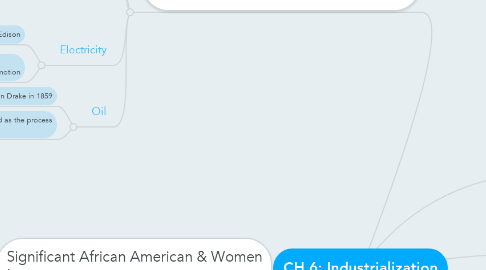
1. Impact of the development of steel, oil, transportation, communication, business
1.1. Steel
1.1.1. Bessemer Process
1.1.1.1. Made the production of steel much more economical
1.1.1.2. Worked by blowing air through molten pig iron to remove impurities
1.1.1.3. Reduced the cost of making steel by 80%
1.2. Communication
1.2.1. Telegraph
1.2.1.1. Invented by Samuel Morse by using electromagnetism
1.2.1.1.1. He also invented a code of long and short spaces to transmit the alphabet
1.2.2. Telephone
1.2.2.1. Invented by Alexander Graham Bell
1.2.2.2. Carries a variable current to a receiver capable of reproducing human voice
1.2.2.3. Made it possible to communicate over long distances using natural speech
1.3. Electricity
1.3.1. Thomas Edison
1.3.1.1. Inventor of the Phonograph and Electric Light Bulb
1.3.2. Electric motors were invented with the application of electromagnetism to create motion
1.4. Oil
1.4.1. First oil well drilled by Edwin Drake in 1859
1.4.2. Petroleum and Gasoline invented as the process of refining oil improved
2. Significant African American & Women Inventors
2.1. Josephine Cochran
2.1.1. Dishwasher
2.2. John Albert Burr
2.2.1. rotary-blade lawnmower
2.3. Granville T. Woods
2.3.1. Multiplex telegraph that could send signals between stations and moving trains & other inventions for trains and streetcars
2.4. Elijah McCoy
2.4.1. Lubricators for steam engines
2.5. Sarah Goode
2.5.1. fold-away bed
2.6. Madam C.J. Walker
2.6.1. Hair and cosmetic products for African American Women
2.7. Jan Ernst Matzeliger
2.7.1. Machine that attaches upper part of shoe to sole
2.8. Garrett Morgan
2.8.1. Safety hood and Smoke protectors for firefghters
3. Key Events and People in Florida History
3.1. Henry Morrison Flagler
3.1.1. Built Ponce de Leon Hotel in 1888 which is now Flagler College
3.1.2. Given the moniker "Father of Miami" for all his contributions in the development of Miami
3.1.3. Created railroads that led from Jacksonville all the way to Key West. Eventually creating the Florida East Coast Railroad
4. First Industrial Revolution
4.1. Relied mostly on the invention of the steam engine
5. Second Industrial Revolution
5.1. Advances in steel, communication, electricity, oil, and transportation
5.2. Emergence of national market
5.3. Rise of Corporations
5.4. Spread of Railways
6. Causes, Course, and Consequences of the Second Industrial Revolution
6.1. Causes
6.1.1. Abundant natural resources like fertile soil. oil, timber, coal, iron ore, phosphates, and copper
6.1.2. Railroads connected a vast majority of the United States thus making it easier and faster for companies to sell and transport goods
